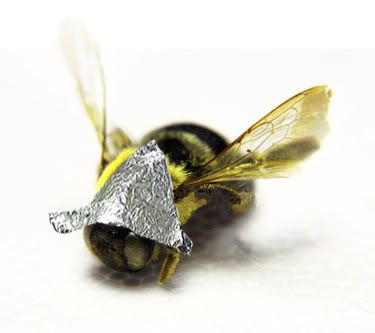Humanist Greens of the Bioregional State, Unite! A Contrast to Anti-Humanist Green Anarchy Solutions

Here's an excellent article relayed from the NWRage website. It allows a nice short contrast between "green anarchy" and the bioregional state proposals. The bioregional state proposals are completely different in recommendations, though in agreement on the seriousness of the issues of anthropogenic climate change and human pollution.
(First, for intellectual fairness that anthropogenic climate change may be only one of many variables, read about sun variations as well as note with concern the same degradative elites greenwashing themselves to stay in informal power globally under a "meet the new boss, same as the old boss" slogan. Yes, George Hunt, we hear what has been unsaid in many high elite promoted frameworks that they promise are good for everyone--while maintaining the same inequalities of power and economy for themselves. However, it hardly detracts in my view whether pollution is a sole direct cause or one of many indirect causes of global climate change, and one should be aware that simply jumping from one elite led tyrannous form of ecological degradation into another elite pressured tyranny as a proferred strategy of solution is hardly a solution--particularly if as argued in Toward a Bioregional State, overly elite frameworks of managerial power are responsible for environmental degradation instead of involved in solutions for it.)
I suppose it comes down to the point that the bioregional state is humanist, rational, secular, tolerant, and institutional in the Enlightenment tradition against forms of political and economic tyranny, while green anarchists are in their own estimation "anti-civilizational" and even anti-humanist in service of green goals. On the contrary, bioregional state proposals show that to be pro-humanist (i.e., to be concerned with reflecting human concerns on local areas) is a very green proposal given the supermajorities for a 'health, ecological, and economic' change in development policy. In other words, humans are your friends, instead of your enemies, in working toward sustainability. Humans because of local ecological self-interest yield a politics toward environmental amelioration--if it is allowed to be expressed. Typically, this ecological self-interest is shielded from its expression in formal institutions and formal policy by a whole slew of gatekeeping forms of political power that service only informal elite forms of degradative developmentalism. However, the political demographic for a change is indeed "already here though waiting to be organized."
Zim Zam with Zerzan
The above linked article is a nice exploration of green anarchism, particularly touching on Zerzan. The bioregional state for a contrast would be for different recommendations than Zerzan, though agreeing with much of his historical analysis that there has been a systematic environmental degradation for thousands of years.
However, the bioregional state premise, built from a lot of comparative historiography, is that environmental degradation is systemic to organizational and political issues of unrepresentative development, instead of something hardwired to humans themselves.
Since it is organizational, it requires organizational solutions. Zerzan's romanticism leads to radical beliefs that "everything will end". The bioregional state view is that everything will continue--until systematic change is rationally applied institutionally, that recognizes the alignment into state policy of already in sync human and ecological issues for environmental amelioration. From widely reported polls, humans are very in sync with concerns about their health, ecology, and economics. What is out of sync are the old frameworks of humanocentric state institutions, instead of ecocentric state institutions described within Toward a Bioregional State.
Instead of Zerzan's and much of the 'deep ecologist' wing's view of a radical difference in human and ecological concern, the bioregional state has always been a humanist green view, without a zero-sum green anarchist philosophical tenet that aiding one destroys the other. On the contrary, aiding one (humans) abets the other (the environmental amelioration).
On this quote from the article: "Globalization. Capitalism. Greed. Civilization. Call it what you will. It will end, the green anarchists insist,...." I'm skeptical anything ever 'ends,' it's only transformed and struggles on as best or worst it can. I think a better bet is working toward crafting institutional solutions that allow for more ecological feedback into democratic institutions instead of gatekeeping against it which is what we have presently.
As said before:
Bioregional democracy (or the Bioregional State) is a set of electoral reforms and commodity reforms designed to force the political process in a democracy to better represent concerns about the economy, the body, and environmental concerns (e.g. water quality), toward developmental paths that are locally prioritized and tailored to different areas for their own specific interests of sustainability and durability. This movement is variously called bioregional democracy, watershed cooperation, or bioregional representation, or one of various other similar names--all of which denote democratic control of a natural commons and local jurisdictional dominance in any economic developmental path decisions—while not removing more generalized civil rights protections of a larger national state.
In other words, if a lot of "green anarchists" (or anyone) wanted to get together and run their watershed they way they wanted, that's fine because that's the way it would work--as long as externalities to other watersheds are demoted. It would be up to the people involved in a particular watershed, of which there would be many different variations--as long as externalities to other watersheds are demoted.
The supermajorities supporting such a 'health, ecology, and local economy' developmentalism are already there, that is the issue. So the main issue is aligning the existing formal institutions of democracy to this, instead of allowing unrepresentative elites to gatekeep against 'The Three Pink Elephants in the Room: Health, Ecology, Economy.'
It's Green Vs. Gray, instead of Green Vs. Humans-or Even Instead of Left vs. Right
The policies of the U.S.'s version of the unsustainable developmental party (otherwise known as the Janus Party--two faced Democrats and Republicans linked together) are merely an avoidance of the social politics supported by super-majorities in polls on health care, environment, and sustainability.
These three issues of health care, ecology, and economic sustainability are the true core of U.S. grass roots social politics regardless.
Even those who typically 'vote right-wing' (on conservative interpersonal politics) are actually pro-environment socially in the U.S.
See polls above at the link, or quickly reposted below:
"polls health
Majority (65%) of Americans want single-payer health care; willing to pay more taxes to get it. --- In ABCNEWS/Washington Post poll, 3 point margin, Americans by a 2-1 margin, 62-32 percent, prefer universal health insurance program over current employer-based system. 78% dissatisfied with cost of nation's health care, including 54% "very" dissatisfied. Most Americans...54%...now dissatisfied with overall quality of health care in U.S.--first majority in 3 polls since 1993, up 10 points since 2000. --- Public wants government to play leading role in providing health care for all. In the same poll, by almost a two-to-one margin (62% to 33%), Americans said that they preferred a universal system that would provide coverage to everyone under a government program, as opposed to current employer-based system. Slightly different question asked by Kaiser, June '03: more than 7 in 10 ten adults (72%) agreed government should guarantee health insurance for all citizens even if it means repealing most tax cuts passed under President George W. Bush--less than one-quarter (24%) disagreed with this. --- Americans overwhelmingly agree access to health care should be a right. In 2000, as in 1993, 8 in 10 agreed health care be provided equally to citizens; over half agreed “strongly” or “completely.” In 2004, 76% agreed strongly or somewhat that health care should be a right.
polls ecology
The majority (77%) think we should do "whatever it takes" to protect environment. --- In another poll, reported in The Ecologist, upwards of 80% of the U.S. with little difference between left or right want their environmental laws seriously enforced, as well as strengthened. This is the issue once more that many of the people who 'vote right wing' and may be interpersonally conservative, have the same social policies and weigh in 'on the left' on the health, ecology, and economy issues.
polls economy
The majority (86 percent) favor raising the minimum wage. The majority (60%) favor repealing Bush's tax cuts, or at least those that go only to the rich. --- The majority (87%) think big oil companies are gouging consumers and would support a windfall profits tax. --- The majority (66%) want to reduce the deficit not by cutting domestic spending, but by reducing Pentagon spending or raising taxes."
That is the center--and huge center it is. The 'left/right' thing has totally broken down when left and right PARTY elites both have moved toward globalized privatization support. It has left this super-majority of social politics--for health, ecology, and economy issues--festering WORLDWIDE across all nations.
Greening the Phrygian Cap
For sustainability, there's not going to be a "new totalitarian ideology" that is globally implemented as a 'one size fits all development' plan--whether engineered distantly around an anti-humanistic WTO conference table on the one hand, or even around an equally distant anti-humanistic intellectuals' corner diner coffee table of green anarchists on the other hand. It's not going to come from intellectuals all getting on the same page. It's going to come from people actually introducing themselves collectively to their own common local geographic concerns, finding ways of durably institutionalizing such local concern in the ongoing policy process, and taking that jurisdiction away from unsustainable developmentalist politics.
Who is anyone to decide for anyone else? The bioregional state is an implementation framework for letting people decide for themselves in their own areas, within a larger geopolitical context of their wider-collective choosing as well. It's going to come from allowing more people to decide by giving those geographically situated anywhere in the world the institutional oversight in their own watersheds to affect developmentalism policies in their own particular areas--under the caveat of other watersheds having rights to stop another 'rogue watershed's' pollution through larger state structures. It's the only way that sustainability has been seen to work so far, so extrapolate from that.
Thus, sustainability is going to come from wider institutional input from actual geographies ["...democratic control of a natural commons and local jurisdictional dominance in any economic developmental path decisions--while not removing more generalized civil rights protections of a larger national state."], as well as finding ways around elite gatekeeping collusion via more checks and balances on their ecological tyranny. As said in the book summary:
"Toward A Bioregional State is a novel approach to development and to sustainability. He proposes that instead of sustainability being an issue of population scale, managerial economics, or technocratic planning, an overhaul of formal democratic institutions and commodity choices to be more locally sustainable are required. This is because environmental degradation has more to do with the biased interactions of formal institutions and informal corruption. Because of corruption, and unrepresentative choices of materials associated with it, we have environmental degradation. Current formal democratic institutions of states are forms of informal gatekeeping in politics as well as materials, and as such, intentionally maintain democracy and commodities as ecologically “out of sync”. He argues that we are unable to reach sustainability without a host of additional ecological checks and balances. These ecological checks and balances would demote corrupt uses of formal institutions by removing capacities for gatekeeping against democratic feedback and more democratic material choices. Sustainability is a politics that is already here—only waiting to be formally organized."

Kermit says: "How did I get on this guy's hand?"
(Rocky says: "Where's Zerzan? We think a lot a like.")
The irony is that the green anarchy solutions are as quite anti-humanist as groups of corporate globalizers, Nazi-eugenic fellow travelers in the Rockefeller filled Club of Rome, or the vigilante corporate sponsored terrorism of the 'Wise Use Movement'.
The argument of the bioregional state is that pro-humanist views are solutions to environmental degradation, because it is in human ecological self-interest to reflect a sound ecology--as it is all bound up in their human health and durable economies.
Just for a quick example from the bioregional state, current formal institutions that attempt to register local self-interest are all gerrymandered across the states of the world. If electoral districts were were more aligned 'in sync' with the pro-human pro-ecological self-interest instead of gerrymandered to support gatekeeping for unsustainability against against voter choice, then what Frederick Jackson Turner noticed over 80 years ago, the 'significance of [bioregional] sections' in state political histories instead of political parties or ideologies, might be dusted off for a read once more.
A politics for environmental amelioration, pro-human and pro-ecological, is already there and has always been there: "already there--only waiting to be organized."
Here's a great film about ecological self-interest versus a corrupt governmental developmentalism endlessly gerrymandering and utilizing corrupt informal uses of formal institutions to finagle more anti-human and anti-ecological policies. Only the corrupt informal developmentalism is the cause of environmental degradation, instead of the former. Enjoy. Don't hate people. Help them. They are your friends.
Pickaxe - The Cascadia Free State Story
1 hr 34 min
Pickaxe documents efforts to halt logging at Warner Creek, a federally protected forest in Oregon. Following a suspicious fire in 1991 that cleared the land, Congress suspended environmental regulations to allow logging in the area. Since arson was determined to be the cause of the fire, however, environmental activists argued that allowing logging at Warner Creek would set a bad example and possibly lead to similarly motivated forest fires. What followed was an 11-month battle complete with a 79-day hunger strike and an amazing blockade of a remote mountain logging road. This inspiring documentary shows the power of direct action, determination and good leadership.



